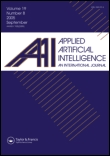
APPLIED ARTIFICIAL INTELLIGENCE
Scope & Guideline
Fostering Dialogue on the Next Generation of AI
Introduction
Aims and Scopes
- Artificial Intelligence Applications:
The journal highlights the application of AI technologies in diverse fields such as healthcare, finance, education, and environmental science, showcasing how AI can solve practical problems and improve efficiency. - Machine Learning and Deep Learning Techniques:
A significant focus is placed on the development and application of machine learning and deep learning algorithms, emphasizing novel methodologies and their effectiveness in various scenarios. - Data Analysis and Predictive Modeling:
Research often involves data-driven approaches, including predictive modeling and analytics, to derive insights from complex datasets across different sectors. - Interdisciplinary Research:
The journal supports interdisciplinary studies that combine artificial intelligence with other fields such as robotics, IoT, and social sciences, fostering collaborations that yield innovative solutions. - Security and Privacy in AI:
There is an increasing emphasis on security and privacy issues related to AI applications, addressing concerns about data protection and ethical implications.
Trending and Emerging
- AI for Social Good:
There is a growing trend towards applying AI for social good, including projects aimed at healthcare, education, and environmental sustainability, reflecting a commitment to leveraging technology for positive societal impact. - Explainable AI (XAI):
Research focusing on explainability and interpretability in AI models is on the rise, driven by the need for transparency in AI decisions, especially in critical applications like healthcare and finance. - Federated Learning and Privacy-Preserving Techniques:
With increasing concerns about data privacy, federated learning and related privacy-preserving techniques are gaining traction, offering innovative solutions for training models without compromising sensitive information. - Automation and Industry 4.0:
The integration of AI in automation processes, particularly within the context of Industry 4.0, is a prominent trend, emphasizing smart manufacturing and intelligent systems that enhance operational efficiency. - AI in Cybersecurity:
Research exploring the application of AI in cybersecurity is emerging, focusing on threat detection, risk assessment, and the development of robust security measures to combat cyber threats.
Declining or Waning
- Traditional AI Techniques:
Research focusing solely on traditional AI techniques without integration of modern approaches, such as deep learning, is becoming less prevalent as the field evolves towards more sophisticated methodologies. - AI in Isolated Domains:
Studies that apply AI to isolated or less impactful domains are waning, with a shift towards applications that demonstrate broader societal or economic relevance. - Theoretical AI Concepts:
While foundational theories remain important, there is a noticeable decline in the publication of purely theoretical papers that do not propose practical applications or implementations. - Narrow AI Solutions:
Research centered on narrow AI solutions that lack generalizability or scalability is less frequently published, as the focus shifts towards more versatile and adaptable AI systems.
Similar Journals

International Journal of Data Science and Analytics
Unleashing the Power of Analytics for TomorrowInternational Journal of Data Science and Analytics, published by SpringerNature, is a leading peer-reviewed journal dedicated to advancing the fields of data science and analytics. Since its inception in 2016, the journal has become an essential platform for researchers, professionals, and students, promoting the exchange of innovative ideas and cutting-edge research. With an impressive categorization in Q2 across multiple domains including Applied Mathematics, Computational Theory and Mathematics, and Information Systems, it demonstrates a notable impact within the academic community, as reflected by its high rankings in various Scopus categories. The journal emphasizes rigorous methodologies and practical applications of data science, making it a valuable resource for those seeking to enhance their understanding and application of data-driven solutions. Although it currently does not operate as an open-access journal, it is committed to disseminating high-quality research that shapes the future of analytics and computation. The journal's headquarters in Switzerland further enriches its international scope, fostering a global dialogue among scholars and practitioners alike.

Journal of Information and Communication Technology-Malaysia
Illuminating the Future of Information and Communication TechnologyJournal of Information and Communication Technology-Malaysia is a respected open-access journal published by UNIV UTARA MALAYSIA PRESS, dedicated to advancing knowledge in the fields of Information Technology, Computer Science, and Mathematics. With an ISSN of 1675-414X and an E-ISSN of 2180-3862, this journal has been providing a platform for innovative research since its establishment in 2009. The journal is indexed in Scopus with commendable rankings in Mathematics and Computer Science categories, highlighting its contribution to the academic community, particularly with its Q3 quartile status in both fields as of 2023. As it converges research from 2011 to 2024, the journal invites submissions that explore contemporary challenges and technological advancements, catering to a global audience of researchers, professionals, and students interested in the rapidly evolving domains of ICT. By ensuring open access to its articles, the journal promotes widespread dissemination and accessibility of cutting-edge research, thereby supporting the collaborative development of ideas and solutions in these critical areas.
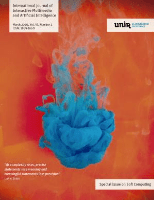
International Journal of Interactive Multimedia and Artificial Intelligence
Championing High-Quality Research in Interactive MultimediaThe International Journal of Interactive Multimedia and Artificial Intelligence, published by UNIV INT RIOJA-UNIR in Spain, is a leading Open Access journal that has been fostering knowledge dissemination in the field since 2008. With an ISSN of 1989-1660 and an impressive impact characterized by its Q1 and Q2 rankings across major categories in Artificial Intelligence and Computer Science, the journal serves as a crucial platform for researchers and professionals eager to explore innovative applications and technological advancements. This journal is particularly distinguished by its commitment to high-quality peer-reviewed research, evident in its current Scopus rankings, which place it among the top percentile in various computer science domains, including Statistics, Signal Processing, and Computer Vision. The journal's scope encompasses a wide array of topics that intersect with multimedia and artificial intelligence, making it an invaluable resource for students and emerging scholars aiming to deepen their understanding and contribute to these vibrant fields. Through its Open Access model, it ensures that research is accessible to a global audience, thus enhancing the visibility and impact of the scientific discourse.

Studies in Informatics and Control
Advancing Knowledge in Informatics and ControlStudies in Informatics and Control is a distinguished academic journal published by the NATL INST R&D INFORMATICS-ICI, specializing in the interdisciplinary fields of Computer Science and Electrical and Electronic Engineering. With an ISSN of 1220-1766 and a recognized standing within its field, this journal aims to foster innovation and disseminate high-quality research findings from 2010 through 2024. It maintains a significant presence in the academic landscape, holding a Q3 ranking in both Computer Science (miscellaneous) and Electrical and Electronic Engineering categories for 2023, which underscores its commitment to advancing knowledge and technology in these areas. While the journal is not open access, it provides valuable insights and results that are essential for researchers, professionals, and students striving to develop their expertise in informatics and control systems. Based in Romania, its contributions traverse international boundaries, appealing to a global audience keen on the latest developments and trends within these rapidly evolving fields.

Progress in Artificial Intelligence
Driving Breakthroughs in Intelligent SystemsProgress in Artificial Intelligence is a leading journal published by SpringerNature, dedicated to advancing knowledge and research in the field of artificial intelligence. With a strong emphasis on the latest developments from 2012 through 2024, this journal enjoys a prominent position, holding a Q2 ranking in the prestigious Artificial Intelligence category for 2023, as well as achieving an impressive ranking of 64 out of 350 in the Computer Science - Artificial Intelligence category on Scopus, placing it in the 81st percentile. Progress in Artificial Intelligence serves as an essential platform for researchers, professionals, and students seeking to share innovative algorithms, applications, and theoretical advancements. Although it operates under a subscription model, its commitment to disseminating high-quality research and fostering collaboration in the AI community significantly contributes to the ongoing evolution of this exciting discipline.

Machine Learning and Knowledge Extraction
Driving Innovation in Artificial Intelligence and EngineeringMachine Learning and Knowledge Extraction, published by MDPI, is an esteemed Open Access journal that has been at the forefront of disseminating cutting-edge research since its inception in 2019. Based in Switzerland, this journal has established itself as a significant contributor to the fields of Artificial Intelligence and Engineering, currently ranking in the Q2 category in Artificial Intelligence and Q1 in Engineering (miscellaneous) for 2023. With a notable Scopus ranking, it holds the 35th position out of 204 in Engineering, placing it in the 83rd percentile, while it ranks 127th out of 350 in Computer Science, reaching the 63rd percentile. Machine Learning and Knowledge Extraction serves as a vital platform for researchers, professionals, and students alike, promoting insightful discussions, innovative methodologies, and profound discoveries in machine learning and data extraction techniques. The journal's open access model ensures that groundbreaking research is widely accessible, fostering collaboration and advancing knowledge across various disciplines.
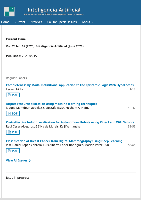
Inteligencia Artificial-Iberoamerical Journal of Artificial Intelligence
Fostering Collaboration in Artificial Intelligence Development.Inteligencia Artificial-Iberoamerican Journal of Artificial Intelligence, published by the ASOC ESPANOLA INTELIGENCIA ARTIFICIAL, serves as a pivotal platform for disseminating cutting-edge research in the burgeoning fields of artificial intelligence and software development. Established in 1997 as an Open Access journal, it ensures broad accessibility to its scholarly content, thus fostering collaboration and knowledge exchange amongst researchers, professionals, and students across the globe. Based in Valencia, Spain, the journal currently operates within a significant timeline spanning from 2004 to 2010 and 2012 to 2024, enabling continual contributions to the academic discourse. Although it holds a Q4 quartile ranking in both the Artificial Intelligence and Software categories and a notable yet competitive Scopus ranking among its peers, the journal remains committed to advancing the understanding and application of sophisticated AI methodologies. As it continues to embrace innovative research, this journal stands as a crucial reference point for those keenly navigating the complexities of artificial intelligence in a rapidly evolving digital landscape.
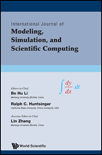
International Journal of Modeling Simulation and Scientific Computing
Exploring New Dimensions in Computational ScienceThe International Journal of Modeling Simulation and Scientific Computing, published by WORLD SCIENTIFIC PUBL CO PTE LTD, is a pivotal resource in the realms of Computer Science Applications and Modeling and Simulation. With an ISSN of 1793-9623 and an E-ISSN of 1793-9615, this journal serves as a platform for innovative and high-quality research from 2010 to 2024, contributing to the advancement of methodologies and applications in various scientific fields. Although currently categorized in the Q4 quartile for both recognized domains and positioned in the 42nd and 36th percentiles in the Scopus rankings for Mathematics and Computer Science respectively, the journal encourages scholarly exchange and fosters the integration of modeling and computational analysis in scientific research. Researchers, professionals, and students alike will find this journal an essential tool to stay updated with trends, methodologies, and cutting-edge findings in simulation and computational techniques that drive scientific inquiry today.
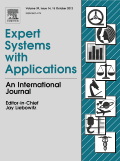
EXPERT SYSTEMS WITH APPLICATIONS
Navigating the Future of Intelligent TechnologiesEXPERT SYSTEMS WITH APPLICATIONS is a premier journal published by PERGAMON-ELSEVIER SCIENCE LTD, dedicated to showcasing cutting-edge research in the fields of Artificial Intelligence, Computer Science Applications, and Engineering. With an esteemed Q1 ranking across multiple categories, this journal not only reflects high-quality scholarship but also plays a pivotal role in advancing the application of expert systems and intelligent technologies in various sectors. Operating from the United Kingdom, it features a wide range of insightful articles that address complex challenges and offer innovative solutions through interdisciplinary approaches. Researchers and practitioners can access invaluable resources to inform their work, contributing to the journal's strong reputation and growing readership. With its convergence of relevant technologies from 1990 to 2025, EXPERT SYSTEMS WITH APPLICATIONS stands as an essential source for those aiming to push the boundaries of knowledge in these thriving fields, making it a key platform for both established experts and emerging scholars.

Engineering Journal-Thailand
Bridging local insights with global engineering innovation.Engineering Journal-Thailand, published by Chulalongkorn University, Faculty of Engineering, is a prominent academic journal dedicated to advancing knowledge and research in the diverse field of engineering. With an ISSN of 0125-8281 and an unwavering commitment to quality, the journal has established a substantial presence in the academic community since its inception in 2009. As of 2023, it is ranked in the Q3 category for Engineering (miscellaneous) and has achieved a Scopus rank of 137 out of 307, placing it in the 55th percentile of general engineering journals. Although it operates without open access, its impact within the engineering domain is significant, providing a vital platform for researchers, professionals, and students to disseminate their findings and engage with contemporary engineering challenges. The journal serves as a vital resource for those seeking to stay at the forefront of engineering innovation and contributes to the global discourse by bridging local insights with international perspectives.